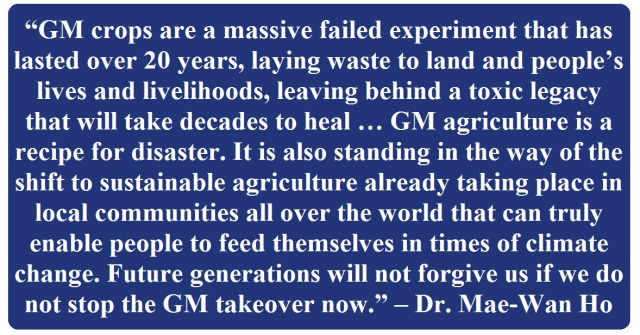Two frequently viewed posts:
- “The Monsanto Protection Act of 2013,” July 28, 2016
- “Websites to Avoid Posting from: A Community Alert,” is an advisory post this is updated on occasion. Some websites are not safe to visit or share links from. A list has been created that identifies some website that range from suspect to certain harmful websites.
This is a companion blog to Ban GMOs Now.
For more information on genetically modified organisms (GMOs or GM) see:
GMWatch
Independent Science News
“There is a compelling case for banning all environmental releases of GMOs now, and with that the glyphosate herbicides. Action can be taken locally in communities, villages, towns, municipalities, regions, as well as nationally and globally. It must be done now; for time is running out. We need to shift comprehensively to non-GM sustainable ecological farming in order to feed ourselves under climate change. We the people need to reclaim our food and seed sovereignty from the corporate empire before they destroy our food and farming irreversibly.” – Dr. Mae-Wan Ho and Dr. Eva Sirinathsignhji, “Ban GMOs Now – Health and Environmental Hazards – Especially in Light of the New Genetics,” Institute of Science in Society; 2013 (52 pages)

“We do not believe that Bill Gates Foundation through its pet project AGRA, together with partners like Monsanto can save the world from Hunger. They should stop politicizing hunger. The technologies that are promoted by them for our people are not farmer nor environmentally friendly. Some of them have not been tested fully to determine their effects on the environment and consumers.” – Mariann Bassey (FOE Nigeria), “AGRA’s Technology Push in Africa,” Friends of the Earth International; September 2012 (7 pages)
“Regulators have been assuring the public that ‘GM food is safe’ because people have been eating GM food since its first release in 1994 and no one has been found to fall ill or die from it … By now, the evidence against the safety of GM food and feed has accumulated to such an extent that the regulators should be answering a charge of criminal negligence at the very least in continuing their campaign of denial and misrepresentation, while failing to impose a ban on further releases of all GM crops until and unless they have been proven safe by thorough independent investigations.” – Dr. Mae-Wan Ho, Joe Cummins & Peter Saunders, “GM Food Nightmare Unfolding in the Regulatory Sham,” Microbial Ecology in Health and Disease, vol.19; May 14, 2007 (19 pages)
“Unfortunately, it is impossible to verify that genetically modified crops perform as advertised. That is because agritech companies have given themselves veto power over the work of independent researchers. … Research on genetically modified seeds is still published, of course. But only studies that the seed companies have approved ever see the light of a peer-reviewed journal. In a number of cases, experiments that had the implicit go-ahead from the seed company were later blocked from publication because the results were not flattering … It would be chilling enough if any other type of company were able to prevent independent researchers from testing its wares and reporting what they find … But when scientists are prevented from examining the raw ingredients in our nation’s food supply or from testing the plant material that covers a large portion of the country’s agricultural land, the restrictions on free inquiry become dangerous.” – The Editors “Do Seed Companies Control GM Crop Research?” by the Editors, Scientific American; July 20, 2009
“When those with a vested interest attempt to sow unreasonable doubt around inconvenient results, or when governments exploit political opportunities by picking and choosing from scientific evidence, they jeopardize public confidence in scientific methods and institutions, and also put their own citizenry at risk. Safety testing, science-based regulation, and the scientific process itself, depend crucially on widespread trust in a body of scientists devoted to the public interest and professional integrity. If instead, the starting point of a scientific product assessment is an approval process rigged in favor of the applicant, backed up by systematic suppression of independent scientists working in the public interest, then there can never be an honest, rational or scientific debate.” – Brian Wynne, et al (over 100 signatures), “Séralini and Science: an Open Letter,” Independent Science News; October 2, 2012
“Most studies are performed by industry. Even peer reviewed published papers (if available at all) very often show involvement of industry. There are very few independent studies. Further, the scientific standards of the industry studies do not fulfill basic scientific standards.” – Christoph Then & Andreas Bauer-Panskus, “Flaws in EFSA’s Risk Assessment: Examples from Eight Genetically Engineered Crops,” Testbiotech (2014)
“It’s time we ask ourselves: How long are we going to let Monsanto bully farmers and politicians into controlling the very source of life on earth? How long will we tolerate the growing monopolization and genetic engineering of seeds by an aggressive cabal of chemical and pesticide corporations who pose a deadly threat to our health, our environment and the future of our food? And when does ‘how long’ become too late? … The fable that GMOs are feeding the world has already led to large-scale destruction of biodiversity and farmers’ livelihoods. It is threatening the very basis of our freedom to know what we eat and to choose what we eat. Our biodiversity and our seed freedom are in peril. Our food freedom, food democracy and food sovereignty are at stake.” – Janek Ratnatunga, “Costing Life: Air, Water and Food,” Vol. 12, No. 1; 2014
Ban GMOs Now

